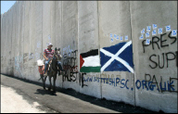Entered into the database on Sunday, July 10th, 2005 @ 16:55:17 MST
Around a quarter of the Palestinian population of Jerusalem face being cut off
from the rest of the holy city after Israel's cabinet approved a new route for
its controversial West Bank barrier. As Palestinians accused Israel of trying to shut down argument over the fate
of occupied east Jerusalem, Israeli Deputy Prime Minister Ehud Olmert said the
plan to pull out of the occupied Gaza Strip should last no more than two weeks. The revised route of the barrier will mean that some 55,000 residents of east
Jerusalem, which was captured and annexed by Israel in 1967, will no longer
be able to travel freely throughout the holy city. Around 230,000 Palestinians
live in the city. It will cut now through the Palestinian neighbourhoods of Shaufat and Akab
as well as the Qalandiya refugee camp on the eastern outskirts of the city. Olmert insisted that citizens who found themselves outside the route of the
barrier would not lose access to services. "They will continue to be the beneficiaries of the social and municipal
services which they are entitled to as holders of residency cards," Olmert
said, adding that building work around Jerusalem should finish in September. Construction has been slowed down in the Jerusalem area following recent rulings
by the Israeli supreme court that said the fundamental rights of some civilians
were being infringed. The status of Jerusalem has long been one of the thorniest issues of the Middle
East conflict. While Israel regards Jerusalem as the undivided capital of the Jewish state,
the Palestinians want to establish the capital of their promised future state
in the east of the city. Palestinian leader Mahmud Abbas said that the move would undermine the peace
process. "I do not believe this is helpful either to the peace process or to Israeli
security," Abbas told reporters. "It will put obstacles in the way
of peace." Chief Palestinian negotiator Saeb Erakat told AFP that the move "has the
potential to destroy the entire peace process" as it appeared that Israel
was trying to impose its own solution on the status of Jerusalem. Israeli Prime Minister Ariel Sharon has made no secret of his intention to
cement control over parts of the occupied West Bank, especially on the outskirts
of Jerusalem, in exchange for a voluntary withdrawal from Gaza. Officials had previously said the operation to uproot the 8,000 Gaza settlers
and several hundred inhabitants in four small West Bank enclaves was likely
to last around a month after it begins in earnest on August 17. Olmert however said the operation -- which will be the first time that Israel
has ever withdrawn from occupied Palestinian territory -- should be over within
a fortnight. Troops are expected to remain behind in Gaza for a short time after
the pullout to dismantle their bases. "I think it will take no more than two weeks," he told the Jerusalem
Post. Olmert's comments reflect a desire by Sharon, nicknamed the bulldozer, to plough
ahead with the disengagement despite continuing efforts to delay it. Reports Sunday said some settler leaders had been involved in talks with Sharon
about delaying the evacuation by three months in exchange for an undertaking
that residents would eventually leave without a struggle. However Avraham Ravitz, a deputy minister in Sharon's coalition from the ultra-orthodox
United Torah Judaism party, later said the talks had come nothing. Sharon has consistently dismissed calls for a postponement as a tactic designed
to block the whole process. The cabinet voted overwhelmingly last week to reject
proposals for a three-month delay. The premier originally envisaged the pullout as a unilateral move but has since
tried to coordinate it with the Palestinians. Abbas said negotiations on a safe passage linking Gaza to the West Bank after
the pullout and on the reopening of Gaza's airport were going well. "The issues of the safe passage, gates (in and out of Gaza) and the airport,
among others, are still unresolved but everybody is working hard and I am hopeful
that results will be reached before the withdrawal starts," he told Egypt's
Al-Ahram daily.
